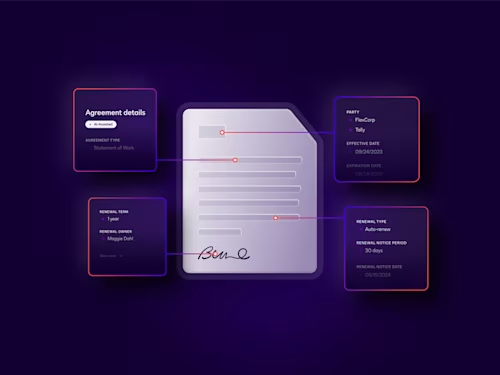
How Contract Automation Drives Precision and Efficiency
Contract automation refers to the use of technologies like workflow automation and artificial intelligence (AI) to handle the creation, negotiation, execution, and management of contracts. Businesses leverage contract automation to streamline agreement processes.

When you generate a contract, precision is key. Without precise language, your organization may be legally exposed and liable for terms to which they did not intend to agree.
But when you need to generate contracts at scale, efficiency becomes a factor that threatens precision—if not done properly. Generating contracts faster means you can process more agreements in the same amount of time, which is good for business. But going too quickly when manually generating a contract can open the process to human error, undoing any groundwork previously laid to ensure precision.
The key to ensuring your contracts are generated with precision and efficiency is contract automation. This technology-driven approach can streamline and simplify the creation, management, and execution of contracts without the risk of human error.
Let’s take a closer look at contract automation and explore how it can benefit every function within an organization.
What is contract automation?
Contract automation refers to the use of technologies like workflow automation and artificial intelligence (AI) to handle the creation, negotiation, execution, and management of contracts. Businesses leverage contract automation to streamline agreement processes.
Why is contract automation beneficial to organizations?
Contract automation offers benefits that can significantly impact an organization's efficiency, productivity, and bottom line. By minimizing manual intervention and human error, contract automation empowers businesses to:
Save time and resources: Automated contract processes eliminate the need for repetitive and time-consuming tasks, allowing employees to focus on high-value activities that drive business growth.
Reduce errors: Manual contract management often leaves room for mistakes, which can be costly to fix. Automation ensures consistency and accuracy by enforcing predefined rules and eliminating the risk of human error.
Enhance collaboration: With contract automation software, teams can collaborate seamlessly in real-time, irrespective of their geographical locations. This boosts communication and accelerates decision-making.
Which problems does contract automation solve?
Contract automation addresses several common organizational challenges:
Lengthy approval cycles. Manual approval processes can lead to delays and missed opportunities. Automation shortens approval cycles by routing contracts to the next signer automatically, ensuring signatures are collected as quickly as possible.
Compliance risks. Ensuring compliance with legal and regulatory standards is paramount. Contract automation helps maintain consistency and adherence to regulations throughout the contract lifecycle by using standardized, pre-approved clauses and AI-powered risk analysis.
Lack of visibility. Tracking contracts manually often results in a lack of visibility into contract statuses and terms. Contract automation provides a centralized repository, making it easy to monitor what is contained within a contract or where it is in the signature process—all in real-time.
Who benefits from contract automation?
Contract automation has significant benefits for any department that needs to send or sign contracts regularly.
Sales
Contract automation is a game-changer for sales teams, revolutionizing how they close deals and drive revenue. By automating contract processes, sales professionals can accelerate the entire sales cycle, from proposal to contract execution. Automated workflows streamline contract creation, negotiation, and approval, reducing bottlenecks and shortening the time it takes to close deals, while standardized contract templates and predefined clauses ensure consistency in messaging and legal compliance.
Human resources
Contract automation transforms how HR teams manage vital documents like employment agreements, NDAs, and other HR-related contracts, ensuring a smooth onboarding and employment experience. HR professionals can expedite the onboarding process by generating employment agreements, benefits documentation, and other essential HR contracts. This ensures a consistent and organized onboarding experience for new employees. HR teams can also enforce consistent HR policies with automated contract templates that minimize the risk of legal disputes and help maintain a strong legal footing for HR-related agreements.
Legal
For the legal department, contract automation is a strategic tool that optimizes contract management and frees up valuable legal resources. Contract automation software facilitates automated contract review and approval workflows so legal teams can quickly review contracts, identify potential risks, and ensure that contracts adhere to legal standards. Automation enforces the use of standardized contract language and predefined clauses, which ensures that contracts are consistent, reducing the likelihood of ambiguous terms or legal disputes.
Finance
Contract automation aids the finance department in managing financial agreements, payment terms, and billing cycles. Contract automation software streamlines the invoicing process by generating invoices automatically based on contract terms and milestones, which can help reduce billing errors, eliminate payment delays, and improve cash flow management. Automated compliance checks ensure that financial agreements adhere to regulatory requirements and internal controls by flagging potential issues, ensuring that financial contracts align with legal and regulatory standards.
Real estate and facilities management
In real estate and facilities management, contract automation simplifies the leasing and rental process. Property managers can generate customized lease templates, incorporating terms specific to different types of properties, and efficiently onboard new tenants. They can also take advantage of automated rent payment tracking and reminders to make sure rent payments are received promptly. Property managers can set up automated reminders for tenants, reducing the likelihood of missed payments and late fees.
IT and technology
For IT departments, contract automation is valuable in managing software licensing agreements by tracking license usage, ensuring compliance with licensing terms, and preventing unexpected software audits and penalties. It also helps in the management of service-level agreements (SLAs), by enabling teams to monitor SLA metrics in real-time and triggering alerts automatically when service thresholds are breached, allowing IT teams to pinpoint the source of the issue and take corrective actions to prevent future breaches.
Automate contracts with Docusign
Contract automation has the ability to reshape how organizations handle contracts. By using automation to streamline processes, reduce errors, and enhance collaboration, businesses can unlock increased efficiency and precision across various departments.
Docusign can help organizations automate their contract processes. Learn more about Docusign Intelligent Agreement Management today.
Related posts
Docusign IAM is the agreement platform your business needs


